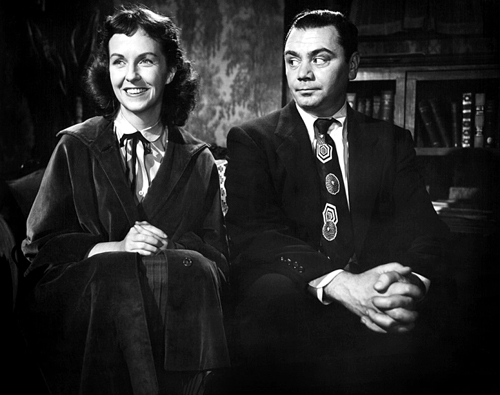Ernest Borgnine shines as a lovable lug in Delbert Mann’s 1955 award-winning classic film, Marty. His portrayal of a Brooklyn-area butcher looking for love continues to resonate more than half a century after its original release.
An everyday love story

Ernest Borgnine shines as a lovable lug in Delbert Mann’s 1955 award-winning classic film, Marty. His portrayal of a Brooklyn-area butcher looking for love continues to resonate more than half a century after its original release.
Borgnine will introduce a screening of Marty at the Portland Art Museum’s Northwest Film Center Thursday, April 5. He will appear alongside Ben Mankiewicz of Turner Classic Movies as part of the channel’s 2012 Road to Hollywood film tour.
“This is the first and only program in the Turner Classic Movies tour where Ernest Borgnine will be in attendance,” said Jessica Lyness, spokesperson for the film center. “He will introduce the film, and people will have the opportunity to ask him questions.”
Marty tells the story of an unlikely romance between two people plagued by private insecurities. Set in 1950s New York City, the film follows Marty (Borgnine), a lonely butcher with a golden heart. Pushed by friends and family to spend his weekends looking for love, the bulky bachelor finds only rejection and heartache in the 72nd Street nightclubs.
Fortune changes for Marty at one of the clubs when a successful snob blows off his own date, the plain-Jane chemistry teacher Clara Snyder (Betsy Blair). Marty consoles her as she cries on the balcony and sweeps her back to the dance floor, where they discover they’ve both suffered the same floggings of rejection.
Just when he begins to take control of his situation, Marty’s peers turn on him. His mother, who had chided him for being unwed, suddenly speaks out against his romance. His friends lambast him for dating an unattractive woman and pressure him to return to the nightlife. Even his cousin suggests that he remain single and unburdened.
Will he succumb to peer pressure, or forge his own path by calling back the girl his friends and family have denounced?
Marty takes place during a two-day period, giving the film immediacy and focus. It is less the story of a romance than the story of a meeting that could become a romance. The film’s attention to detail in the dialogue and characters provides a poignant portrait of their relationships and underlying motives.
The performances infuse the film with warmth and humor. Marty deftly captures its time and place, and although the gender roles and dynamics seem dated by today’s standard, the themes are timeless.
The film was a critical success when it was first released and garnered several Academy Awards. In 1956, Marty won Oscars for Best Screenplay, Best Actor, Best Director and Best Picture.
Thursday’s screening is the last stop of TCM’s third annual Road to Hollywood tour, which featured 10 films in 10 cities. The tour began with Robert Mulligan’s To Kill a Mockingbird (1962) in New York City, and each stop has featured a special guest.
Thursday’s event will mark the first partnership between Turner and the Northwest Film Center. Lyness said that a successful viewing could lead to future screenings.
“Our audiences are a good match with that of Turner Classic Movies,” she said. “We show a lot of classic cinema and film noir, and their audience fits with our features.”







